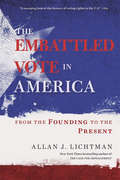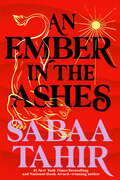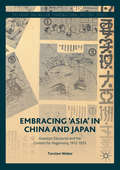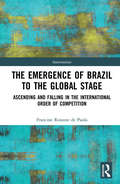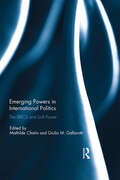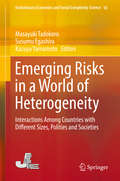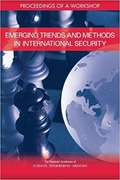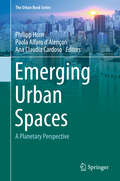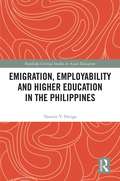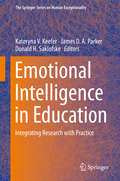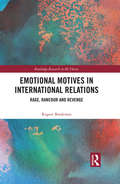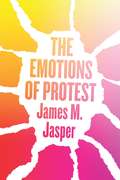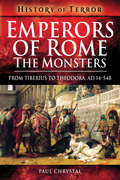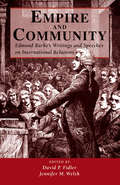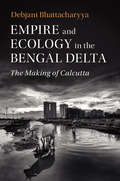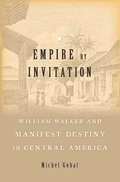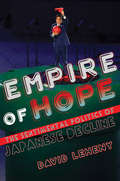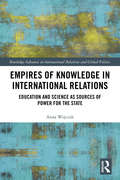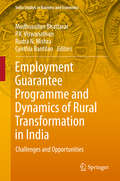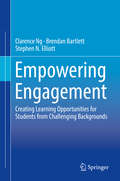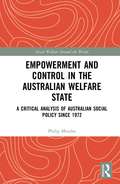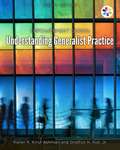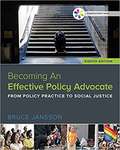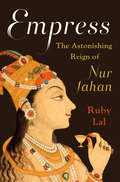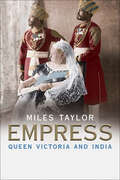- Table View
- List View
The Embattled Vote in America: From the Founding to the Present
by Allan J. LichtmanAmericans have died for the right to vote. Yet our democratic system guarantees no one, not even citizens, the opportunity to elect a government. Allan Lichtman calls attention to the founders’ greatest error—leaving the franchise to the discretion of individual states—and explains why it has triggered an unending struggle over voting rights.
An Ember in the Ashes (An Ember in the Ashes #1)
by Sabaa TahirBOOK ONE IN THE NEW YORK TIMES BESTSELLING SERIESOne of Time Magazine&’s 100 Best Fantasy Books of All TimeOne of Time Magazine&’s 100 Best YA Books of All Time Instant New York Times bestsellerFrom #1 New York Times bestselling author Sabaa TahirAmazon's Best Young Adult Book of 2015People's Choice Award winner - Favorite FantasyBustle's Best Young Adult Book of 2015 &“This novel is a harrowing, haunting reminder of what it means to be human — and how hope might be kindled in the midst of oppression and fear.&” — The Washington Post &“An Ember in the Ashes could launch Sabaa Tahir into JK Rowling territory…It has the addictive quality of The Hunger Games combined with the fantasy of Harry Potter and the brutality of Game of Thrones.&”—Public Radio International "An Ember in the Ashes glows, burns, and smolders—as beautiful and radiant as it is searing."—Huffington Post &“A worthy novel – and one as brave as its characters.&” —The New York Times Book Review Laia is a slave. Elias is a soldier. Neither is free. Under the Martial Empire, defiance is met with death. Those who do not vow their blood and bodies to the Emperor risk the execution of their loved ones and the destruction of all they hold dear. It is in this brutal world, inspired by ancient Rome, that Laia lives with her grandparents and older brother. The family ekes out an existence in the Empire&’s impoverished backstreets. They do not challenge the Empire. They&’ve seen what happens to those who do. But when Laia&’s brother is arrested for treason, Laia is forced to make a decision. In exchange for help from rebels who promise to rescue her brother, she will risk her life to spy for them from within the Empire&’s greatest military academy. There, Laia meets Elias, the school&’s finest soldier—and secretly, its most unwilling. Elias wants only to be free of the tyranny he&’s being trained to enforce. He and Laia will soon realize that their destinies are intertwined—and that their choices will change the fate of the Empire itself.
Embracing 'Asia' in China and Japan
by Torsten WeberThis book examines how Asianism became a key concept in mainstream political discourse between China and Japan and how it was used both domestically and internationally in the contest for political hegemony. It argues that, from the early 1910s to the early 1930s, this contest changed Chinese and Japanese perceptions of 'Asia', from a concept that was foreign-referential, foreign-imposed, peripheral, and mostly negative and denied (in Japan) or largely ignored (in China) to one that was self-referential, self-defined, central, and widely affirmed and embraced. As an ism, Asianism elevated 'Asia' as a geographical concept with culturalist-racialist implications to the status of a full-blown political principle and encouraged its proposal and discussion vis-#65533;-vis other political doctrines of the time, such as nationalism, internationalism, and imperialism. By the mid-1920s, a great variety of conceptions of Asianism had emerged in the transnational discourse between Japan and China. Terminologically and conceptually, they not only paved the way for the appropriation of 'Asia' discourse by Japanese imperialism from the early 1930s onwards but also facilitated the embrace of Sino-centric conceptions of Asianism by Chinese politicians and collaborators.
The Emergence of Brazil to the Global Stage: Ascending and Falling in the International Order of Competition (Interventions)
by Francine Rossone de PaulaHow do discourses about Brazil’s emergence as a global actor at the beginning of the twenty-first century reinforce particular temporal and spatial formations that enable the perpetuation of international hierarchies? This volume argues that while the phenomenon of ‘emergence’ was celebrated as the conquest of more authority for Brazil on the global stage, especially as Brazil was presented as a leader of developing countries, discourses about Brazil as an actor who was finally arriving at its promised future as a global player were also perpetuating a spatiotemporal structure that continues to reward some societies and individuals at the expense of many others. Brazil's success or failure has depended from the beginning on how well it would perform its pre-determined role as a newly relevant or emergent 'global player'. Power and empowerment have been conceptualized in a way that discursively inhibits any form of escape from the temporal and spatial confines of a world order marked by geopolitical and geoeconomic competition. The book can be seen as an initial step towards an exploration of alternative forms of thinking, doing, and being, temporally and spatially, that are not limited to the competition among states for geopolitical status in the international system. This work will be of great interest to students and scholars of critical international relations, international politics and Latin American studies.
Emerging Powers in International Politics: The BRICS and Soft Power
by Mathilde Chatin Giulio M. GallarottiThe rise of large and rapidly growing nations is having a significant impact on the global order, as their expanding influence reshapes the structure of power in the international system. These emerging powers are increasingly asserting themselves as major actors on the global scene. Leading this cadre of emerging powers are five nations referred to as the BRICS – Brazil, Russia, India, China and South Africa. This book takes inventory of both the individual and collective soft power of this rising bloc of nations. Having embraced the potential of this newly emphasized type of power as a means of generating international influence, these nations have dedicated substantial effort and resources to implementing a soft power offensive.This book was originally published as a special issue of the Journal of Political Power.
Emerging Risks in a World of Heterogeneity: Interactions Among Countries with Different Sizes, Polities and Societies (Evolutionary Economics and Social Complexity Science #10)
by Kazuya Yamamoto Susumu Egashira Masayuki TadokoroThis uniquely interdisciplinary volume analyzes the challenges posed by the heterogeneity of the world where radically different players are crammed into increasingly limited political, commercial, social, and ecological space. The rapid rise of Communist Party-ruled China is posing serious challenges to the postwar politico-economic architecture dominated by the United States. Russia, once expected to become a partner of the liberal Western international order, has started behaving in an increasingly unilateral fashion. The developing world is more characterized by failed governance rather than convergence to liberal democracies as was hoped by many Western authors. Given links provided by low-cost carriers, the Internet, and trade and investment, we simply cannot shield ourselves from influences, whether benign or malign, from neighbors on this planet.The authors, including political scientists, economists, social physicists, and experts on complexity theory and informatics, examine how interactions among actors with different properties can cause problems, and they analyze risks resulting from the interactions. While employing a variety of approaches to address topics such as economic interdependence among democracies and authoritarian states, the development assistance regimes, internal conflicts in developing countries, and cyber security, the whole volume presents a clear overview of challenges and risks the world is facing. This work makes a valuable contribution to students of social sciences as well as to practitioners interested in the emerging global order.
Emerging Trends and Methods in International Security: Proceedings of a Workshop
by Engineering Medicine National Academies of SciencesBeginning in October 2017, the National Academies of Sciences, Engineering, and Medicine organized a set of workshops designed to gather information for the Decadal Survey of Social and Behavioral Sciences for Applications to National Security. The second workshop focused on emerging trends and methods in international security and this publication summarizes the presentations and discussions from this workshop.
Emerging Urban Spaces: A Planetary Perspective (The Urban Book Series)
by Ana Claudia Cardoso Paola Alfaro D’Alençon Philipp HornThis edited collection critically discusses the relevance of, and the potential for identifying conceptual common ground between dominant urban theory projects – namely Neo-Marxian accounts on planetary urbanization and alternative ‘Southern’ post-colonial and post-structuralist projects. Its main objective is to combine different urban knowledge to support and inspire an integrative research approach and a conceptual vocabulary which allows understanding the complex characteristics of diverse emerging urban spaces. Drawing on in-depth case study material from across the world, the different chapters in this volume disentangle planetary urbanization and apply it as a research framework to the context-specific challenges faced by many `ordinary' urban settings. In addition, through their focus on both Northern- and Southern urban spaces, this edited collection creates a truly global perspective on crucial practice-relevant topics such as the co-production of urban spaces, the ‘right to diversity’ and the ‘right to the urban’ in particular local settings.
Emigration, Employability and Higher Education in the Philippines (Routledge Critical Studies in Asian Education)
by Yasmin Y. OrtigaThis book investigates the dilemma of educating students for future work in the context of the Philippines, one of the top sources of migrant labor in the world. Here, colleges and universities are expected to not only educate students for jobs within the country, but for potential employers beyond national borders. It demonstrates how human capital ideology reinforces such export-oriented education, creating an assumed relationship among academic credentials, overseas opportunity, and future migrant remittances. Findings indicate that attempts to produce migrant workers undermine the job security of college instructors, skew local curriculum towards foreign requirements, and challenge efforts to develop academic programs in line with local needs. As more developing nations turn to migration as a development strategy, colleges and universities face increasing pressures to produce future migrant workers who will have an advantage over other nationalities. This book emphasises the importance of understanding how this global phenomenon affects colleges and universities, as well as the teachers and students within these institutions. This book raises important questions on the role of universities in today’s global economy and the effects of contemporary migration flows on developing countries.
Emotional Intelligence in Education: Integrating Research with Practice (The Springer Series on Human Exceptionality)
by James D. Parker Donald H. Saklofske Kateryna V. KeeferThis book highlights current knowledge, best practices, new opportunities, and difficult challenges associated with promoting emotional intelligence (EI) and social-emotional learning (SEL) in educational settings. The volume provides analyses of contemporary EI theories and measurement tools, common principles and barriers in effective EI and SEL programming, typical and atypical developmental considerations, and higher-level institutional and policy implications. It also addresses common critiques of the relevance of EI and discusses the need for greater awareness of sociocultural contexts in assessing and nurturing EI skills. Chapters provide examples of effective EI and SEL programs in pre-school, secondary school, and university contexts, and explore innovative applications of EI such as bullying prevention and athletic training. In addition, chapters explore the implications of EI in postsecondary, professional, and occupational settings, with topics ranging from college success and youth career readiness to EI training for future educators and organizational leaders. Topics featured in this book include: Ability and trait EI and their role in coping with stress, academic attainment, sports performance, and career readiness.Implications of preschoolers’ emotional competence for future success in the classroom.Understanding EI in individuals with exceptionalities.Applications of school-based EI and SEL programs in North America and Europe.Policy recommendations for social-emotional development in schools, colleges and universities.Developing emotional, social, and cognitive competencies in managers during an MBA program.Emotional intelligence training for teachers.Cross-cultural perspective on EI and emotions. Emotional Intelligence in Education is a must-have resource for researchers, professionals, and policymakers as well as graduate students across such disciplines as child and school psychology, social work, and education policy.
Emotional Motives in International Relations: Rage, Rancour and Revenge (Routledge Research in International Relations Theory)
by Rupert BrodersenThe study of emotions in International Relations is gaining wide-spread attention. Within the "emotional turn" in IR the emotion of rage however has not been given sufficient attention, instead being used as short-hand for irrationality and excess. Rage is arguably one of the oldest and most destructive emotions in human affairs. This book offers an innovative approach that seeks to split rage into its traditional manifestation of aggression and violence, and into a less visible, passive manifestation of Nietzschean Ressentiment. This model facilitates a comprehensive understanding of revisionist motivation, from the violence of ISIS to the oppositionism of Putin’s Russia. The aim is to illustrate how a lack of violence can belie vengeful impulses and a silent rage, and how acts of violence, regardless of brutality, are often framed as a type of justice and "moral imperative" in the mind of the aggressor. This book raises serious questions and concerns about legitimacy and order in global affairs, and offers a firm theoretical basis for the exploration of present day conflicts.
The Emotions of Protest
by James M. JasperIn Donald Trump’s America, protesting has roared back into fashion. The Women’s March, held the day after Trump’s inauguration, may have been the largest in American history, and resonated around the world. Between Trump’s tweets and the march’s popularity, it is clear that displays of anger dominate American politics once again. There is an extensive body of research on protest, but the focus has mostly been on the calculating brain—a byproduct of structuralism and cognitive studies—and less on the feeling brain. James M. Jasper’s work changes that, as he pushes the boundaries of our present understanding of the social world. In The Emotions of Protest, Jasper lays out his argument, showing that it is impossible to separate cognition and emotion. At a minimum, he says, we cannot understand the Tea Party or Occupy Wall Street or pro- and anti-Trump rallies without first studying the fears and anger, moral outrage, and patterns of hate and love that their members feel. This is a book centered on protest, but Jasper also points toward broader paths of inquiry that have the power to transform the way social scientists picture social life and action. Through emotions, he says, we are embedded in a variety of environmental, bodily, social, moral, and temporal contexts, as we feel our way both consciously and unconsciously toward some things and away from others. Politics and collective action have always been a kind of laboratory for working out models of human action more generally, and emotions are no exception. Both hearts and minds rely on the same feelings racing through our central nervous systems. Protestors have emotions, like everyone else, but theirs are thinking hearts, not bleeding hearts. Brains can feel, and hearts can think.
Emperors of Rome: From Tiberius to Theodora, AD 14–548 (History Of Terror Ser.)
by Paul ChrystalAs with everything else, there were good and bad Roman emperors. The good, like Trajan (98117), Hadrian (117138), Antoninus Pius (138161) and Marcus Aurelius (161180) were largely civilized and civilizing. The bad, on the other hand, were sometimes nothing less than monsters, exhibiting varying degrees of corruption, cruelty, depravity and insanity. It is a sobering thought that these ogres were responsible for governing the greatest civilization in the world, simultaneously terrorizing, brutalizing and massacring. Tiberius, Caligula, Nero, Domitian, Commodus, Caracella, Elagabalus, Septimius Severus, Diocletian, Maximinus Thrax, Justinian and Theodora all had more bad days than good; they are all covered in this book.Their exploits have, of course, been well documented since classical times but much of the coverage can only be called gratuitous, sensationalist or tabloid. This book is different because it is based on primary sources and evidence and attempts to balance out the shocking with any mitigating aspects in each of their lives. Many of our monsters have some redeeming factors and it is important that these are exposed if a true record of their lives is to be conveyed. The book also examines how each of the twelve has been treated for posterity in literature, theatre and film, and the lessons intended to be drawn from popular culture through the ages.
Empire And Community: Edmund Burke's Writings And Speeches On International Relations
by David P. FidlerEdmund Burke has long been regarded as one of the most important political thinkers of the late eighteenth century, and his writings and speeches continue to inspire and challenge to the present day. But Burke's thinking on international relations has not been fully addressed by the scholarly community. This situation is ironic given that so much of Burke's political efforts and thoughts were directed at international events and controversies, particularly British policies toward Ireland, America, India, and revolutionary France.David Fidler and Jennifer Welsh provide the first comprehensive presentation of Burke's thinking on international relations in Empire and Community: Edmund Burke's Writings and Speeches on International Relations. They analyze in detail Burke's perspective on international relations developed during his long and distinguished parliamentary career, establishing him as a ?classical thinker? on international relations; they also analyze where Burke's perspective on international relations belongs theoretically in the contemporary study of the subject. These analyses are followed by edited selections from Burke's writings and speeches on Ireland, America, India, and the French Revolution. Empire and Community gives Burke's thinking on international relations the emphasis and scholarly attention it deserves.
Empire and Ecology in the Bengal Delta: The Making Of Calcutta (Studies In Environment And History )
by Debjani BhattacharyyaWhat happens when a distant colonial power tries to tame an unfamiliar terrain in the world's largest tidal delta? <P><P>This history of dramatic ecological changes in the Bengal Delta from 1760 to 1920 involves land, water and humans, tracing the stories and struggles that link them together. Pushing beyond narratives of environmental decline, Bhattacharyya argues that 'property-thinking', a governing tool critical in making land and water discrete categories of bureaucratic and legal management, was at the heart of colonial urbanization and the technologies behind the draining of Calcutta. The story of ecological change is narrated alongside emergent practices of land speculation and transformation in colonial law. Bhattacharyya demonstrates how this history continues to shape our built environments with devastating consequences, as shown in the Bay of Bengal's receding coastline.<P> The first environmental history of land markets in South Asia.<P> Explores how the law responded to the ecological changes of the Bengal delta and how those laws continue to shape our contemporary relationship to the land and the water.<p> Shows landscapes as essentially fluid and changeable, destabilizing the fixities of cartography.
Empire by Invitation: William Walker and Manifest Destiny in Central America
by Michel GobatMichel Gobat traces the untold story of the rise and fall of the first U.S. overseas empire to William Walker, a believer in the nation’s manifest destiny to spread its blessings not only westward but abroad as well. In the 1850s Walker and a small group of U.S. expansionists migrated to Nicaragua determined to forge a tropical “empire of liberty.” His quest to free Central American masses from allegedly despotic elites initially enjoyed strong local support from liberal Nicaraguans who hoped U.S.-style democracy and progress would spread across the land. As Walker’s group of “filibusters” proceeded to help Nicaraguans battle the ruling conservatives, their seizure of power electrified the U.S. public and attracted some 12,000 colonists, including moral reformers. But what began with promises of liberation devolved into a reign of terror. After two years, Walker was driven out. Nicaraguans’ initial embrace of Walker complicates assumptions about U.S. imperialism. Empire by Invitation refuses to place Walker among American slaveholders who sought to extend human bondage southward. Instead, Walker and his followers, most of whom were Northerners, must be understood as liberals and democracy promoters. Their ambition was to establish a democratic state by force. Much like their successors in liberal-internationalist and neoconservative foreign policy circles a century later in Washington, D.C., Walker and his fellow imperialists inspired a global anti-U.S. backlash. Fear of a “northern colossus” precipitated a hemispheric alliance against the United States and gave birth to the idea of Latin America.
Empire of Hope: The Sentimental Politics of Japanese Decline
by David LehenyEmpire of Hope asks how emotions become meaningful in political life. In a diverse array of cases from recent Japanese history, David Leheny shows how sentimental portrayals of the nation and its global role reflect a durable story of hopefulness about the country's postwar path. From the medical treatment of conjoined Vietnamese children, victims of Agent Orange, the global promotion of Japanese popular culture, a tragic maritime accident involving a US Navy submarine, to the 2011 tsunami and nuclear disaster, this story has shaped the way in which political figures, writers, officials, and observers have depicted what the nation feels.Expressions of national emotion do several things: they construct the boundaries of the national body, they inform and discipline appropriate expression, and they depoliticize messy problems that threaten to produce divisive questions about winners and losers. Most important, they work because they appear to be natural, simple and expected expressions of how the nation shares feeling, even when they paper over the extraordinary divergence in how the nation's citizens experience each incident. In making its arguments, Empire of Hope challenges how we read the relations between emotion and politics by arguing—unlike those who build from the neuroscientific turn in the social sciences or those developing affect theory in the humanities—that the focus should be on emotional representation rather than on emotion itself.
Empires of Knowledge in International Relations: Education and Science as Sources of Power for the State (Routledge Advances in International Relations and Global Politics)
by Anna WojciukThis volume offers the first systematic account of how education and science have become sources of power for the states in international relations and what factors have effected this development. Drawing together extensive empirical data on the USA, the EU, Japan, Korea, Singapore, and China, Wojciuk explores the factors and mechanisms through which education and science translate into the international position of different states, highlighting how they continue to contribute to the reproduction of the centre-periphery system in global politics. Written in an accessible style, the author argues that these factors increase the likelihood of success for states in international relations, even if in themselves, they cannot guarantee it. Specifying the ways in which education and science contribute to the power of a state in international relations, Wojciuk focuses on mechanisms involved in state-building processes and economic development, and invokes cases of successful competitive strategies involving education and science. This work will be of interest to scholars in a wide range of subjects including education research, international relations and international political economy.
Employment Guarantee Programme and Dynamics of Rural Transformation in India: Challenges and Opportunities (India Studies in Business and Economics)
by Madhusudan Bhattarai P. K. Viswanathan Rudra N. Mishra Cynthia BantilanThis book offers an assessment of the performance, impact, and welfare implications of the world’s largest employment guarantee programme, the Mahatma Gandhi National Rural Employment Guarantee Act (MGNREGA). Launched by the Indian government, the programme covers entire rural area of the country. The book presents various micro-level analyses of the programme and its heterogeneous impacts at different scales, almost a decade after its implementation. While there are some doubts over the future of the scheme as well as its magnitude, nature and content, the central government appears committed to it, as a ‘convergence scheme’ of various other welfare and rural development programmes being implemented at both national and state level. The book discusses the outcomes of the programme and offers critical insights into the lessons learnt, not only in the context of India, but also for similar schemes in countries in South and South-East Asia as well as in Africa, and Latin America. Adopting inter-disciplinary perspectives in analysing these issues, this unique book uses a judicious mix of methods---integrating quantitative and qualitative tools---and will be an invaluable resource for analysts, NGOs, policymakers and academics alike.
Empowering Engagement: Creating Learning Opportunities for Students from Challenging Backgrounds
by Clarence Ng Brendan Bartlett Stephen N. ElliottThis book examines promoting engagement for children and adolescents from challenging contexts or who are dealing with challenging conditions. The volume concentrates on three vulnerable groups: marginalized youths who have experienced repeated exclusion and sought their second chance in alternative education; children who are coming from economically, culturally, and linguistically disadvantaged backgrounds; and students with social or emotional issues. It defines engagement as evolving over the course of learning, an interpersonal as well as personal process involving students, learning environment, teachers, and peers. Chapters identify the complex personal, sociocultural, economic, and systemic barriers that keep these vulnerable students from fully engaging in school, and explore the enabling role of collaborative and supported learning activities in building academic success and a foundation for productive adult lives. In addition, chapters present instructional practices based on engagement enablers. Chapters also pinpoint specific learning skills and subject areas that can provide openings for promoting motivation and participation. Featured topics include: The importance of cognitive and social enablers for promoting learning engagement.Engagement in instruction from teachers and testing within classrooms.Student voice and perspective as a reading engagement enabler.Promoting academic engagement and aspiration for challenging and advanced mathematics.Alternative educational programs for re-engaging marginalized youths who “don’t fit”.Empowering Engagement is a must-have resource for researchers, scientist-practitioners, clinicians, and graduate students in the fields of child and school psychology, educational policy and politics, social work, motivation and learning, schooling and pedagogies, and related disciplines.
Empowerment and Control in the Australian Welfare State: A Critical Analysis of Australian Social Policy Since 1972 (Social Welfare Around the World)
by Philip MendesThis book explores the tensions between the competing social rights and social control functions of the modern Australian welfare state. By critically examining the history and rhetoric of the Australian welfare state from 1972 to the present day, and using the author’s long-standing research on the Australian Council of Social Service and other welfare advocacy groups, it analyses the transformation from rights-based to conditional welfare. The Labor Party Government from 1972-75 is identified as the only clear cut example of Australia positively using welfare payments and services as an instrument to promote greater social equity, inclusion and participation. Since the mid-1970s, the Australian welfare state has gradually retreated from the social rights agenda conceived by the Whitlam Government. Australia has followed other Anglo-Saxon countries in adopting increasingly conditional and paternalistic measures that undermine the protection of social citizenship outside the labour market. In contrast, this text makes the case for an alternative participatory and decentralized welfare state model that would prioritize social care by empowering and supporting welfare service users at a local community level. This book will be of interest to academics, students and policy-makers working within social policy, social work and political sociology.
Empowerment Series: Understanding Generalist Practice
by Karen K. Kirst-Ashman Grafton H. Hull<P>Organized around the authors' coherent and cohesive Generalist Intervention Model, this introductory guide to generalist social work practice gives your students the knowledge and skills they need to work with individuals and families and the foundation knowledge from a generalist perspective to work with groups, communities, and organizations.<P> This edition continues to emphasize the interrelationship between the micro, mezzo, and macro levels of social work practice; and it reflects the latest Educational Policy and Accreditation Standards with empowerment and strengths perspectives for partnering with clients.
Empowerment Series: Becoming An Effective Policy Advocate
by Bruce JanssonJansson's BECOMING AN EFFECTIVE POLICY ADVOCATE teaches you the ins and outs of conducting policy practice, preparing you to become an effective policy advocate during your own career. The eighth edition's coverage includes discussion of such events and issues as Barack Obama's presidency, the presidential primaries and election of 2016, the battle over equality among national politicians in 2016, and many issues facing social agencies. By going beyond the traditional foundational approach to policy, this text helps you develop the skills you need to become an advocate for social change. It offers you practical guidance on how to develop social media campaigns, and discusses ways you can participate in reducing inequality -- the issue that drew the attention of millions of millennials in the presidential election of 2016.
Empress: The Astonishing Reign Of Nur Jahan
by Ruby LalFour centuries ago, a Muslim woman ruled an empire. When it came to hunting, she was a master shot. As a dress designer, few could compare. An ingenious architect, she innovated the use of marble in her parents’ mausoleum on the banks of the Yamuna River that inspired her stepson’s Taj Mahal. And she was both celebrated and reviled for her political acumen and diplomatic skill, which rivaled those of her female counterparts in Europe and beyond. In 1611, thirty-four-year-old Nur Jahan, daughter of a Persian noble and widow of a subversive official, became the twentieth and most cherished wife of the Emperor Jahangir. While other wives were secluded behind walls, Nur ruled the vast Mughal Empire alongside her husband, and governed in his stead as his health failed and his attentions wandered from matters of state. An astute politician and devoted partner, Nur led troops into battle to free Jahangir when he was imprisoned by one of his own officers. She signed and issued imperial orders, and coins of the realm bore her name. Acclaimed historian Ruby Lal uncovers the rich life and world of Nur Jahan, rescuing this dazzling figure from patriarchal and Orientalist clichés of romance and intrigue, and giving new insight into the lives of women and girls in the Mughal Empire, even where scholars claim there are no sources. Nur’s confident assertion of authority and talent is revelatory. In Empress, she finally receives her due in a deeply researched and evocative biography that awakens us to a fascinating history.
Empress: Queen Victoria and India
by Miles TaylorAn entirely original account of Victoria’s relationship with the Raj, which shows how India was central to the Victorian monarchy from as early as 1837 In this engaging and controversial book, Miles Taylor shows how both Victoria and Albert were spellbound by India, and argues that the Queen was humanely, intelligently, and passionately involved with the country throughout her reign and not just in the last decades. Taylor also reveals the way in which Victoria’s influence as empress contributed significantly to India’s modernization, both political and economic. This is, in a number of respects, a fresh account of imperial rule in India, suggesting that it was one of Victoria’s successes.
